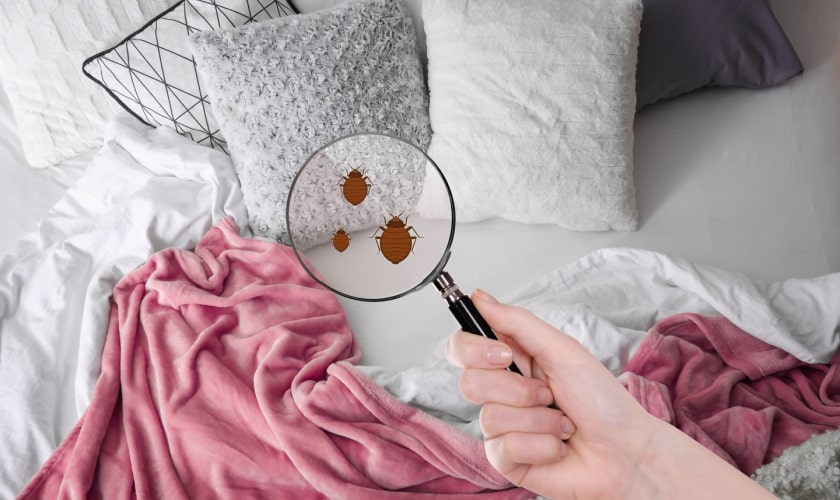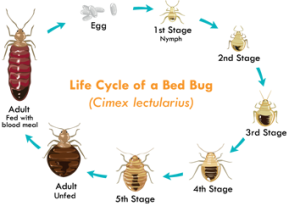Top Kings Cincinnati Bug Control Services: Pest Control Expert Know-how
Wiki Article
Kinds of Insect Control: Which Approach Is Right for Your Problem?
When faced with a bug problem, the option of a proper method for parasite control is critical in effectively handling the circumstance. By exploring the numerous types of pest control approaches offered, individuals can make enlightened decisions customized to their special conditions, guaranteeing a much more effective and lasting end result in parasite removal.Chemical Parasite Control
Chemical bug control involves making use of artificial or naturally acquired chemicals to handle and get rid of pest populations properly. This approach is frequently utilized in agriculture, forestry, and household settings to battle a large range of parasites, including rodents, insects, and weeds. Using chemical pesticides can provide quick and targeted remedies to pest infestations, making it a prominent choice for numerous people and businesses.One of the crucial benefits of chemical bug control is its ability to swiftly get rid of parasites, reducing the risk of damages to plants, building, and human health. By utilizing certain chemicals that target certain insects, this approach can effectively control infestations while lessening damage to valuable organisms and the atmosphere when used properly.
Nonetheless, making use of chemical parasite control also raises issues regarding prospective negative impacts on non-target varieties, water resources, and human wellness. It is crucial to follow safety guidelines, use chemicals responsibly, and think about alternate bug control techniques to reduce these dangers and make sure lasting parasite administration methods.
Organic Parasite Control
Organic bug control, likewise understood as biocontrol, utilizes living microorganisms to take care of and lower pest populations normally. This technique utilizes the power of nature to control parasites without the demand for synthetic chemicals. Biocontrol can involve the intro of natural enemies of the pest varieties, such as predators, parasites, or virus, to subdue bug populations. By using the bug's natural killers or microorganisms, biological bug control supplies a sustainable and ecologically pleasant option to pest management.
Mechanical Bug Control
Using hands-on and physical techniques to manage pest populations, mechanical pest control supplies a different strategy that does not count on making use of living organisms or synthetic chemicals. This approach includes using barriers, catches, or other devices to literally hinder or get rid of insects. By blocking parasite access factors or establishing up traps to capture them, mechanical bug control can successfully decrease problems without presenting chemicals into the setting.One typical example of mechanical parasite control is the usage of mesh displays on doors and home windows to stop insects how to get rid of bed bugs from getting in structures. This simple yet efficient method acts as a physical obstacle, keeping bugs out while enabling correct ventilation. In addition, gadgets like mousetraps, fly swatters, and ultrasonic repellents drop under the mechanical bug control category.
While mechanical bug control methods can be labor-intensive and need normal tracking and upkeep, they provide a lasting and ecologically pleasant remedy for managing parasite infestations. By integrating various mechanical techniques, residential or commercial property proprietors can create a detailed parasite control technique that decreases dependence on chemical pesticides.
Physical Insect Control

Some typical physical insect control approaches consist of making use of barriers such as screens or webs to stop parasite access, catches to catch and remove parasites, and hand-picking to literally eliminate pests from plants or structures. Additionally, strategies like warm treatments can be made use of to manage insects like bed pests by increasing the temperature to degrees that are deadly to the insects.
Physical parasite control is especially useful in integrated pest monitoring (IPM) methods, where multiple parasite control techniques are incorporated for efficient parasite administration while minimizing using chemicals. By utilizing physical parasite control techniques, people can successfully address pest problems with minimal ecological impact.
Integrated Bug Management
When carrying out physical pest control approaches as part of insect monitoring techniques, Integrated Parasite Monitoring (IPM) arises as a comprehensive technique that leverages numerous techniques to successfully regulate pest populations. IPM concentrates on lasting prevention of insects via a combination of biological, social, physical, and chemical devices customized to specific insect concerns. By incorporating multiple control techniques, IPM intends to minimize the dangers linked with pests while likewise minimizing dependence on chemical solutions.One key element of IPM is the emphasis on tracking and analyzing pest populations to determine the most ideal control methods. This aggressive approach permits early intervention and targeted methods, bring about extra efficient bug management. Furthermore, IPM advertises eco-friendly techniques by focusing on non-chemical control approaches and just making use of chemicals as a last option.
Verdict

By making use of the parasite's natural predators or microorganisms, organic bug control offers a ecologically pleasant and lasting service to pest administration. - Kings pest control Cincinnati
Utilizing hand-operated and physical approaches to take care of parasite populaces, mechanical pest control offers a different method that does not rely on the use of living organisms or synthetic chemicals.An effective approach to managing pest populaces without counting on chemical or organic techniques includes the use of physical insect control methods.When executing physical insect control methods as part of parasite monitoring approaches, Integrated Bug pop over here Administration (IPM) emerges as an extensive method that leverages numerous strategies to successfully manage pest populations. Chemical pest control entails the use of pesticides, organic insect control makes use of natural killers, mechanical bug control includes physical barriers, physical parasite control consists of capturing or eliminating insects, and integrated parasite administration combines numerous techniques for a holistic strategy to pest control.
Report this wiki page